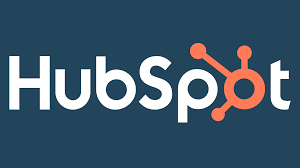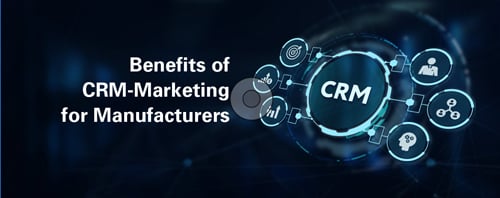Understanding the Benefits for Manufacturing Businesses
Customer relationship management (CRM) software for manufacturing provides tools for manufacturers to gather specific customer information, including phone numbers, addresses, and demographics, and then use it to manage relationships and interactions with current and prospective customers. CRMs allow companies to:
- Gain a better understanding of their customers’ needs
- Identify sales opportunities
- Streamline the production process
- Improve the customer experience
 Manufacturing is one of the top five industries using CRMs to grow their business. To help you evaluate whether CRM software would be beneficial to your manufacturing business, here is a deeper dive into the advantages, features, and elements to consider.
Manufacturing is one of the top five industries using CRMs to grow their business. To help you evaluate whether CRM software would be beneficial to your manufacturing business, here is a deeper dive into the advantages, features, and elements to consider.
What are the Benefits of Manufacturing CRM Software?
For all teams:
- Collaboration and cooperation: CRMs allow all functions within your business to access identical customer information. When everyone is working off the same page, collaboration between teams improves. Customers have a consistent, personalized, and seamless experience, which makes them more likely to buy again.
For sales:
- Sales pipeline visibility: A CRM for manufacturing streamlines the process of tracking each lead through every stage in the sales pipeline. CRM software provides tools to analyze and visualize the pipeline data for a specific account, and to summarize an overall view of the entire pipeline. CRM also allows companies to automate their sales pipeline.
- Higher quality leads: Lead management is a critical component of the sales process, and CRM software helps sales reps more easily identify high-quality leads by tracking the responses to marketing campaigns. CRMs analyze the data to identify which sales leads are most likely to convert to contacts, thereby improving the efficiency of the sales teams, and ultimately increasing sales.
- Better sales projections: A manufacturing CRM tracks the details of every order placed by your customers, including historical peak order times and downtimes. The software analyzes the buying patterns and trends of each customer to compile accurate sales forecasts, helping the sales teams decide what to sell and when to sell.
For customer service:
- Post-sales experience: CRM software organizes customer data, including warranty, repair, or service issues, allowing you to respond to questions and requests more quickly and efficiently. Manufacturing CRMs provide case management functionality so companies can create a system to track customer issues to ensure they are addressed and resolved promptly. These capabilities help you better engage with and retain customers.
- Product quality: CRMs allow manufacturers to gather direct customer feedback about the quality and consistency of their products. Companies can use this information to identify errors in processes that may be contributing to product defects and make changes to improve product quality.
For production:
- Production planning: Manufacturing CRMs leverage sales forecast information to help with production planning. A detailed production plan not only allows you to budget correctly for production costs, but also for overall company expenditures.
- Demand forecasting: Sales forecast data provided by CRMs also allow manufacturers to allocate production resources to manage inventory and meet projected customer demand.
- Supply chain visibility: CRM software provides data on operations, distribution chains, order processing, and inventory and warehouse management to help you manage material supply and production schedules—ultimately informing effective supply chain decisions.

Is HubSpot CRM Good for Small Businesses?
There are three types of CRM software: operational, analytical, and collaborative. Operational CRMs are beneficial to businesses that have linear sales processes—like small manufacturers—that are looking to automate their workflow.
HubSpot’s operational CRM can simplify and streamline your main business processes: it's sales tool, marketing tool, service tool, and an operational tool that also provides historical and real-time analytics, allowing for team collaboration and oversight for seamless customer interactions. The software will help generate leads, convert leads into contacts, and their customer service infrastructure helps you engage with and retain your customers.

Specifically, HubSpot’s CRM provides marketing automation to simplify tasks such as email campaigns, reaching out to contacts, and distributing content offers. It also features sales automation to streamline the sales process and free up time for sales team members. This includes email scheduling, tracking sales calls, and workflows. HubSpot’s CRM provides total visibility of the sales pipeline on a “Deals” dashboard so you can see your entire sales funnel in real time.
An important feature of HubSpot’s CRM is that it provides service automation designed for an optimal customer experience. It allows direct correspondence between customers and service reps and includes designated email inboxes, chat bots, and live chats. Service automation can include ticketing systems to delegate service tasks, and features such as FAQ pages. In addition, customer interactions are tracked automatically no matter the method—calls, email, social media.
What Are the Key Features of Manufacturing CRM Software?
- Forecasting tools: built-in algorithms allow manufacturers to project sales and manage inventory
- Sales territory management: location-based customer data enables market segmentation and account planning
- Channel management: manage relationships with partners and distributors
- Custom dashboard and reports: view distributors, suppliers, resellers, and customers, and identify new trends and opportunities, monitor sales goals, and analyze team performance
- Configure-price-quote (CPQ) application: includes quote management and generation, product catalog, inventory tracking
- Integration options: connect your CRM with your ERP
- Business process management: build workflows and automate processes
When deciding whether a CRM is right for your manufacturing company, there a few key considerations. If you are using a manual process to manage leads, orders, and customer service issues, a CRM is a good idea. Make sure you can justify the return on investment and be aware that if you have some CRM functionality in an ERP system, it may not be enough.
Grant Marketing can help you make this decision. Download your free copy of our eBook, Benefits of CRM Marketing for Manufacturers, to learn more about how CRM can power your marketing activities. Give us a call at (413) 259-0319 or check out our schedule to set up a time to talk!


